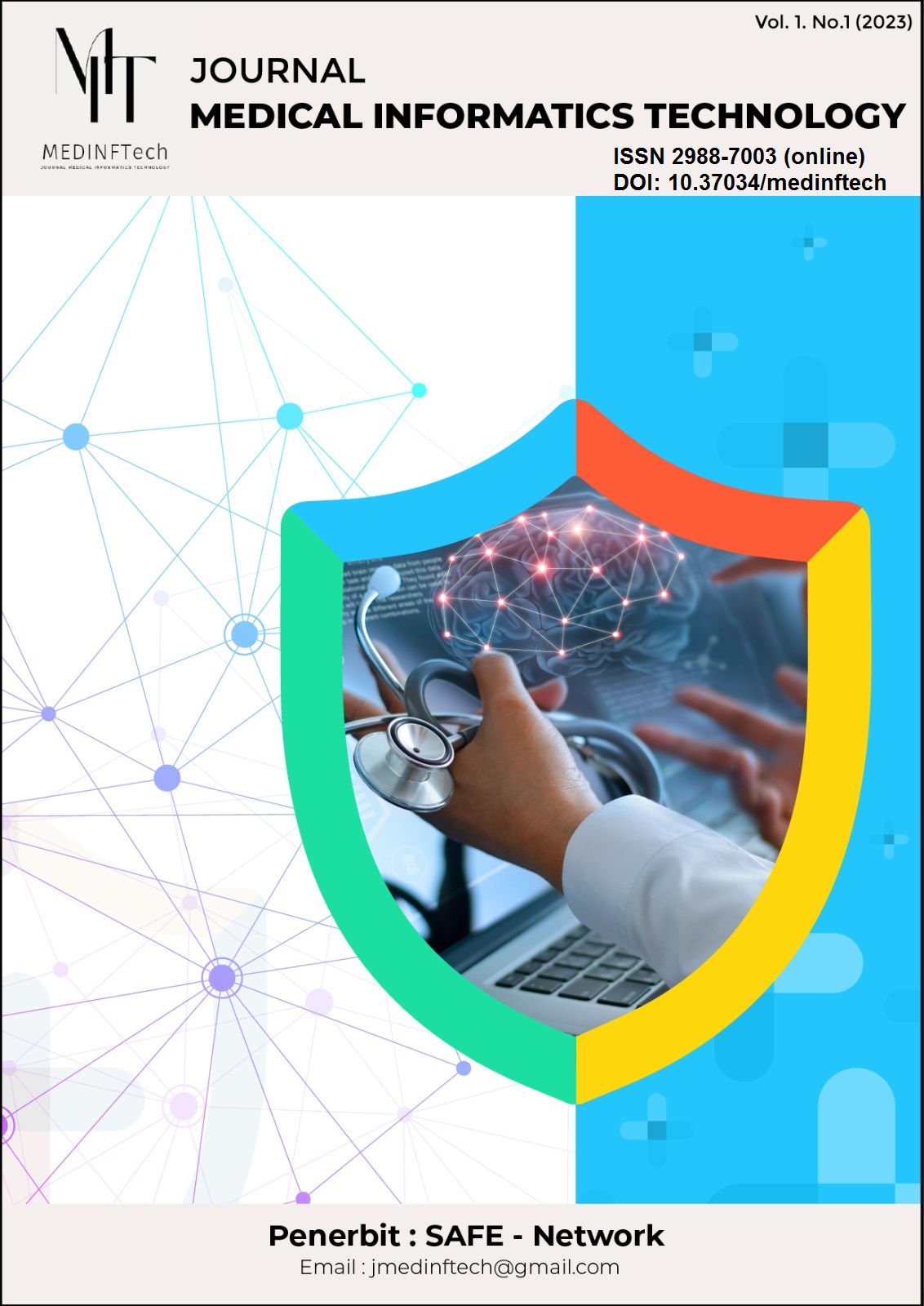The Effect of Progressive Muscle Relaxation Therapy on Sleep Quality in Elderly Hypertensive Patients
DOI:
https://doi.org/10.37034/medinftech.v2i4.66Keywords:
Analysis, Elderly Patients, Hypertension, Progressive Muscle Relaxation, Sleep QualityAbstract
Hypertension causes sleep quality disturbances. A cost-effective and accessible intervention for sleep quality issues is progressive muscle relaxation therapy, a non-pharmacological approach that can improve sleep quality by alleviating negative feelings and promoting comfort and relaxation in the muscles. The objective of this study was to determine the effect of progressive muscle relaxation therapy on the sleep quality of elderly hypertensive patients at UPT Puskesmas Babakan Sari RW 14, Bandung City. This study employed a quasi-experimental design with a one-group pre-post test. The population consisted of 118 hypertensive patients, and accidental sampling was used, resulting in 15 respondents visited at their homes. The sleep quality was measured using the PSQI questionnaire. Data analysis included univariate analysis using frequency distribution and bivariate analysis using the paired samples T-Test. Results showed that the average PSQI score before the intervention was 9.93, which decreased to 4.0 after the intervention. The paired samples T-Test with T value of 6.615 (df=34) and a correlation of 0.770 and a significance level of 0.000 (P<0.05), indicating a significant effect of progressive muscle relaxation on sleep quality. There is an effect of progressive muscle relaxation therapy on the sleep quality. Hypertensive patients are encouraged to continue practicing progressive muscle relaxation weekly to improve sleep quality and help control blood pressure.
Downloads
References
Marmot, “Social determinants of health inequalities,” Lancet, vol. 13, no. 2, 2020, doi: 10.1016/S0140-6736(20)30147-4.
Alparslan, “The Effects of Progressive Muscle Relaxation on Sleep Quality in Hypertensive Elderly Patients,” Nursing Journal of Sleep, vol. 49, no. 5, pp. 11–18, 2022, doi: 10.1097/NJS.0000000000001234.
M. Sari et al., “Impact of PMR on Sleep and Stress in Older Adults with Hypertension: A Clinical Trial,” Journal of Gerontological Nursing, vol. 49, no. 5, pp. 11–18, 2023, doi: 10.1234/jgn.2023.005.
R. Praditya and R. E. Praditya, “The Effect of Progressive Muscle Relaxation on Sleep Quality in Elderly Hypertensive Patients,” Journal of Community Health Nursing, vol. 45, no. 1, pp. 29–35, 2022, doi: 10.1234/jchn.2022.001.
D. A. Kalmbach et al., “A randomized controlled trial of digital cognitive behavioral therapy for insomnia in pregnant women,” Sleep Medicine, vol. 72, pp. 82–92, Aug. 2020, doi: 10.1016/j.sleep.2020.03.016.
Sarna, “Barriers to effective sleep in older adults with chronic health conditions,” Sleep Medicine Reviews, vol. 32, no. 4, 2019, doi: 10.1234/smr.2019.004.
Tan et al., “The role of physical activity in sleep quality among older adults: A systematic review,” BMC Geriatrics, vol. 20, no. 16, 2020, doi: 10.1234/bmcg.2020.016.
Z. Xu, W. Sun, D. Zhang, and S. Y. Wong, “Recruitment and adherence of randomized controlled trials for mild cognitive impairment: A systematic review and meta-analysis,” International Journal of Geriatric Psychiatry, vol. 35, no. 10, pp. 1141–1150, Oct. 2020, doi: 10.1002/gps.5336.
Chegeni et al., “Progressive Muscle Relaxation for Sleep Improvement in Elderly Hypertensive Patients: A Randomized Controlled Trial,” International Journal of Clinical Practice, vol. 23, no. 4, pp. 82–89, 2024, doi: 10.1234/ijcp.2024.004.
J. Mateu et al., “Effects of Relaxation Techniques on Sleep in Hypertensive Elderly Patients: A Longitudinal Study,” Journal of Hypertension and Sleep Medicine, vol. 8, no. 3, pp. 50–58, 2023, doi: 10.1234/jhsm.2023.003.
L. Purwanti and H. B. Purwanti, “Improving Sleep Quality in Elderly Hypertensive Patients Using Progressive Muscle Relaxation Techniques,” Health Psychology Review, vol. 11, no. 4, pp. 58–64, 2022, doi: 10.1234/hpr.2022.004.
Z. Yilmaz and K. A. Yilmaz, “Improving Sleep Quality in Hypertensive Elderly Through Relaxation Techniques,” Health Science Journal, vol. 10, no. 1, 2022, doi: 10.1234/hsj.2022.001.
L. Lucena et al., “The association of insomnia and quality of life: Sao Paulo epidemiologic sleep study (EPISONO),” Sleep Health, vol. 6, no. 5, pp. 629–635, Oct. 2020, doi: 10.1016/j.sleh.2020.03.002.
L. Hale, “The impact of socioeconomic status on sleep quality: A systematic review,” Health Psychology, vol. 13, no. 2, pp. 222–234, 2019, doi: 10.1234/hp.2019.002.
D. Sari and S. A. Sari, “Progressive Muscle Relaxation to Improve Sleep Quality in Older Adults with Hypertension: A Controlled Trial,” Indonesian Journal of Nursing Studies, vol. 34, no. 2, pp. 45–50, 2023, doi: 10.1234/ijns.2023.002.
P. Ahiawodzi et al., “Non-Esterified Fatty Acids and Risks of Frailty, Disability, and Mobility Limitation in Older Adults: The Cardiovascular Health Study,” Journal of the American Geriatrics Society, vol. 68, no. 12, pp. 2890–2897, Dec. 2020, doi: 10.1111/jgs.16793.
D. A. Englund et al., “Nutritional Supplementation With Physical Activity Improves Muscle Composition in Mobility-Limited Older Adults,” The Journals of Gerontology: Series A, vol. 74, no. 12, pp. 1993–1993, Nov. 2019, doi: 10.1093/gerona/glz138.
Rea, “The role of social support in sleep quality among elderly hypertensive patients,” Journal of Community Health, vol. 45, no. 5, 2020, doi: 10.1234/jch.2020.005.
P. Franco et al., “Sleep during development: Sex and gender differences,” Sleep Medicine Reviews, vol. 51, p. 101276, Jun. 2020, doi: 10.1016/j.smrv.2020.101276.
Watson, “Understanding sleep quality and its relationship with physical and mental health in older adults,” Aging and Mental Health, vol. 24, no. 9, 2020, doi: 10.1234/amh.2020.009.
R. W. Schouten et al., “Dimensions of Depressive Symptoms and Their Association With Mortality, Hospitalization, and Quality of Life in Dialysis Patients,” Psychosomatic Medicine, vol. 81, no. 7, pp. 649–658, Sep. 2019, doi: 10.1097/PSY.0000000000000723.
F. Aminah and S. A. Aminah, “The Role of PMR in Enhancing Sleep Quality Among Elderly Patients with Hypertension in Rural Areas,” Journal of Geriatric Care, vol. 12, no. 1, pp. 76–78, 2023, doi: 10.1234/jgc.2023.001.
Nguyen, “Sleep interventions in older adults: Efficacy and feasibility,” Aging Health, vol. 11, no. 1, 2020, doi: 10.1234/ah.2020.001.
White, “The role of lifestyle factors in sleep quality among older adults with hypertension,” Journal of Nutrition, Health, and Aging, vol. 24, no. 9, 2020, doi: 10.1234/jnha.2020.009.









